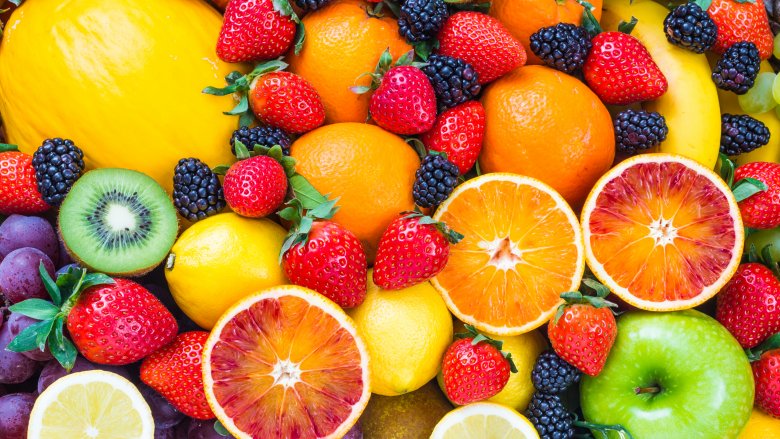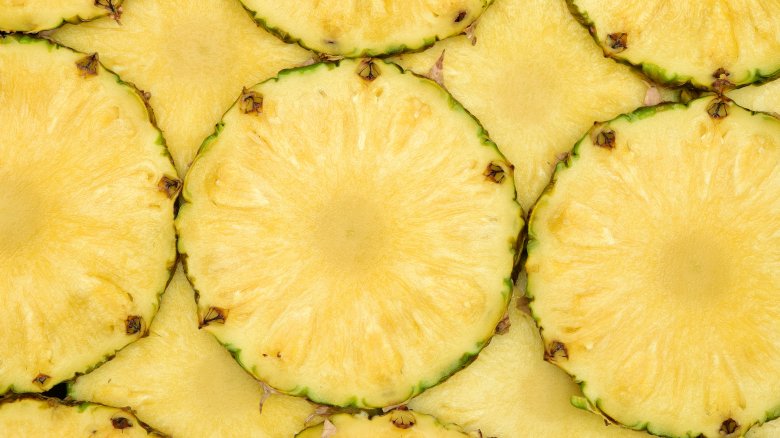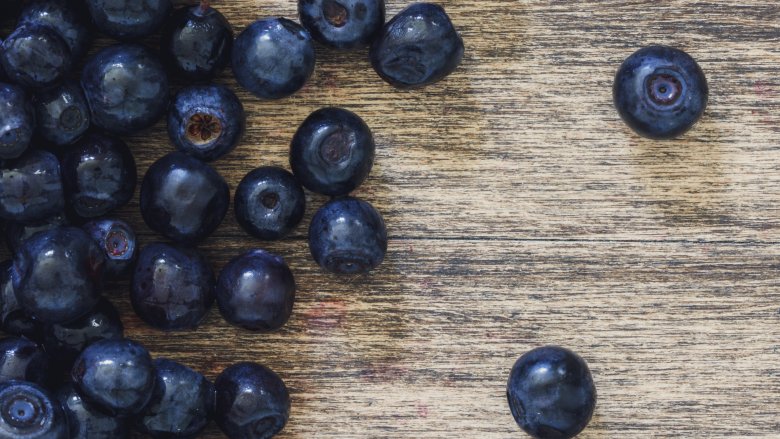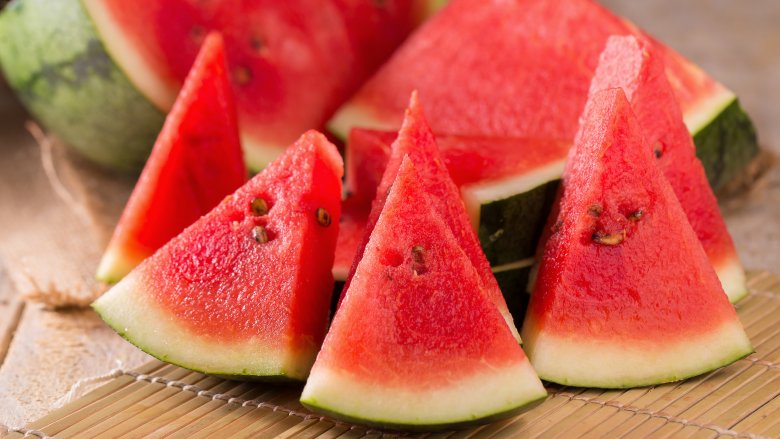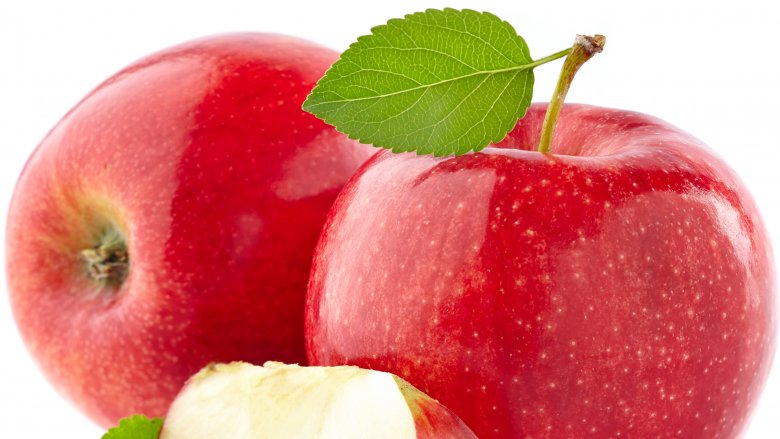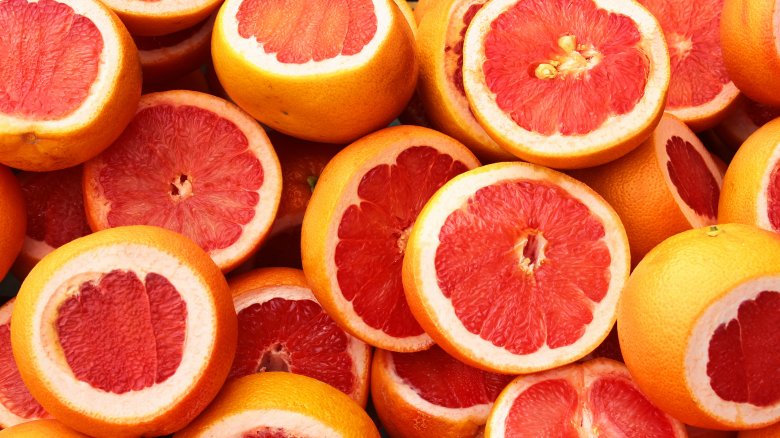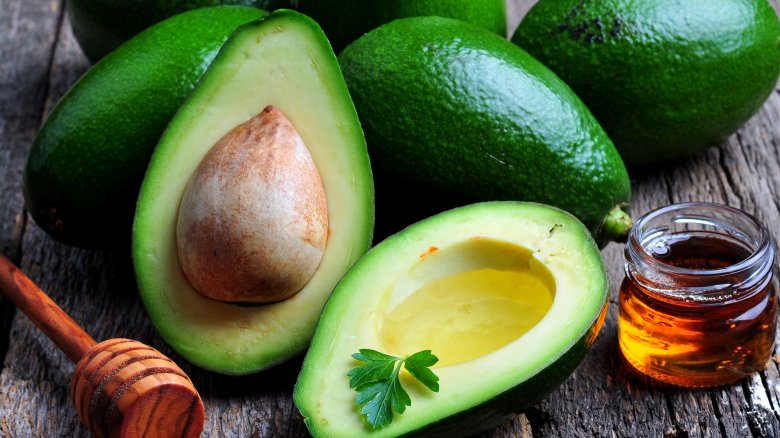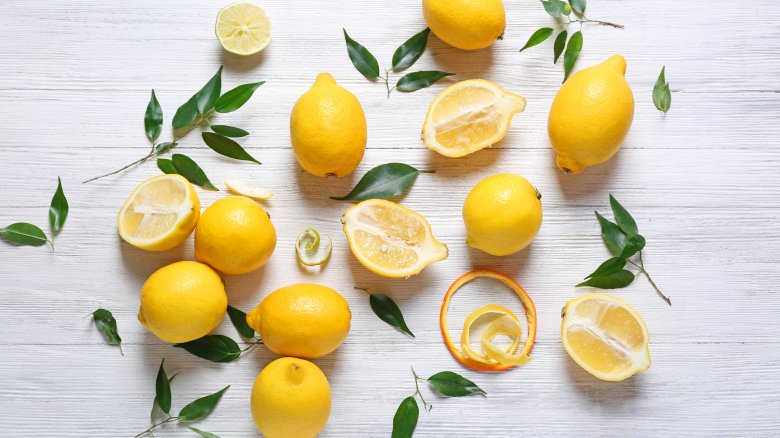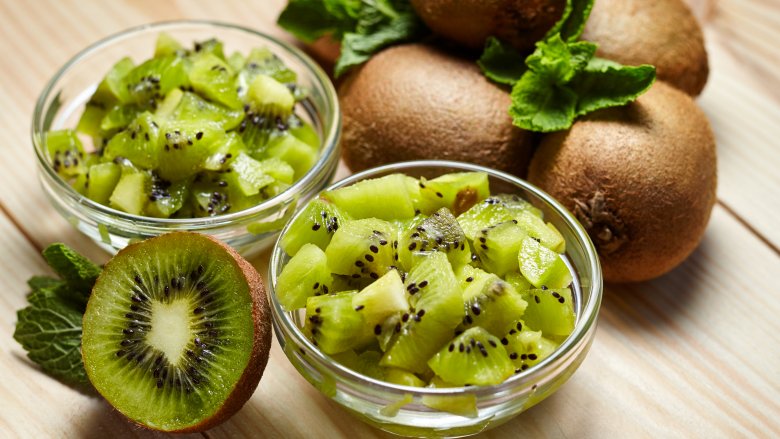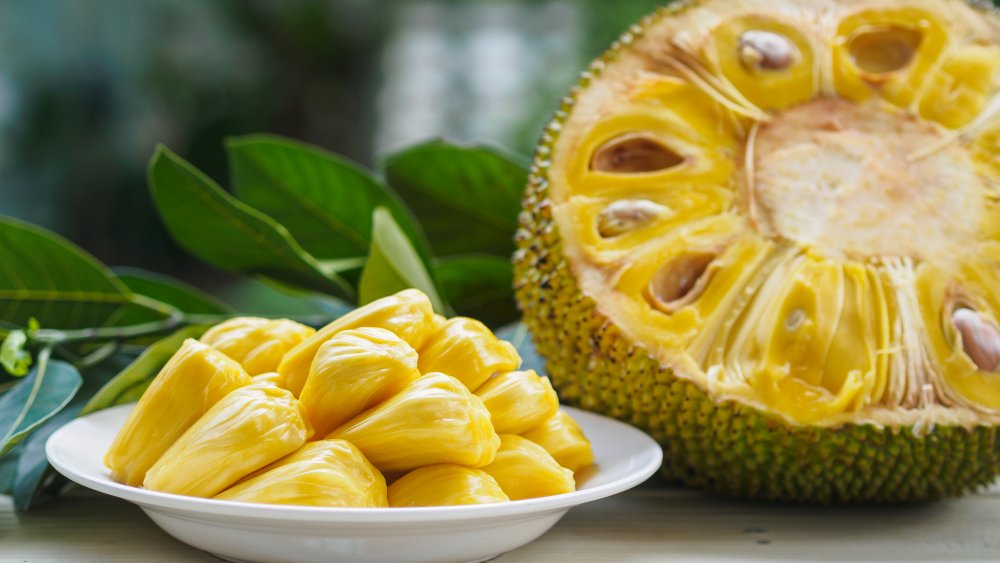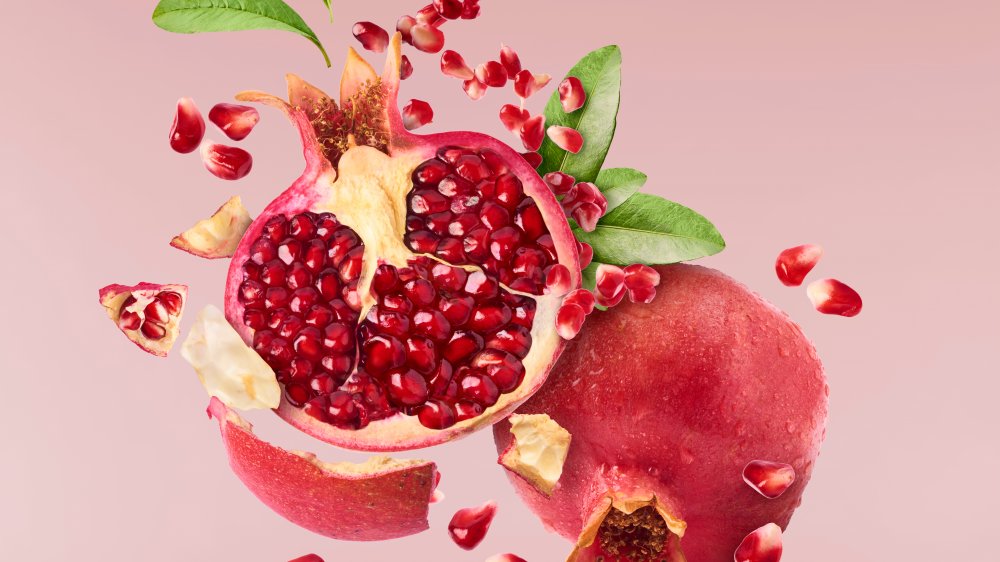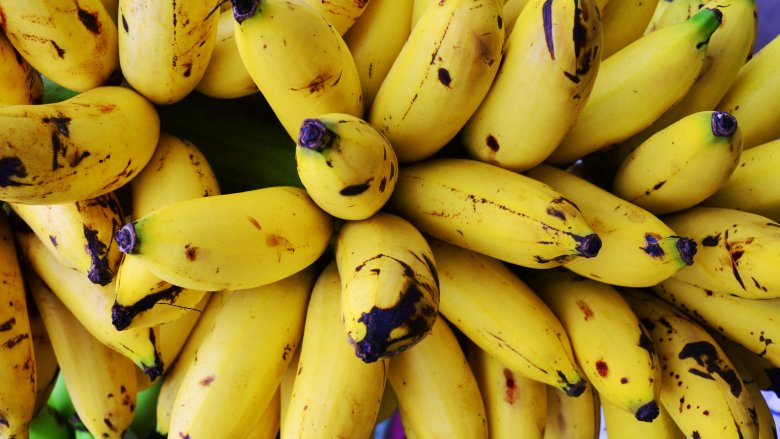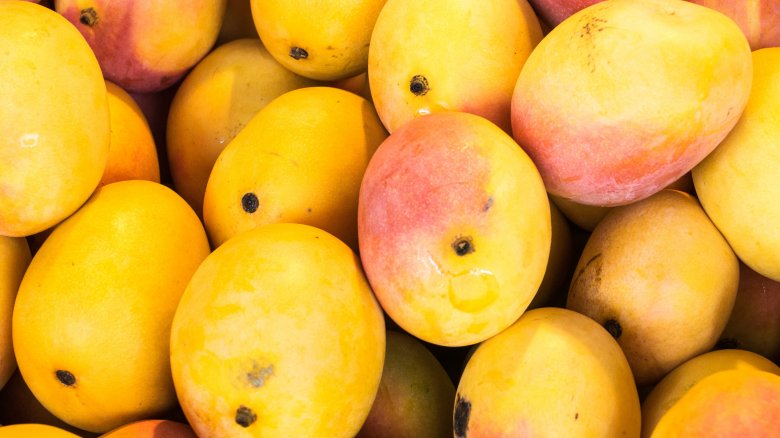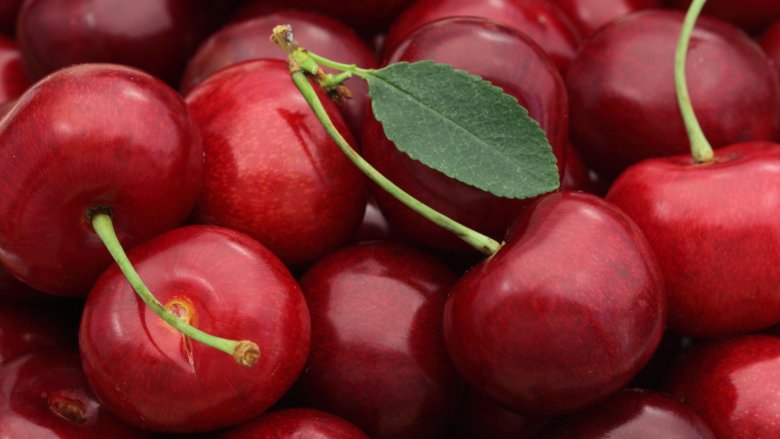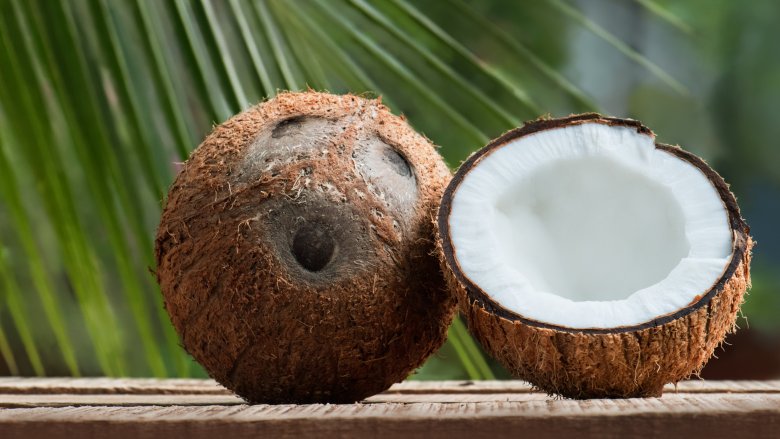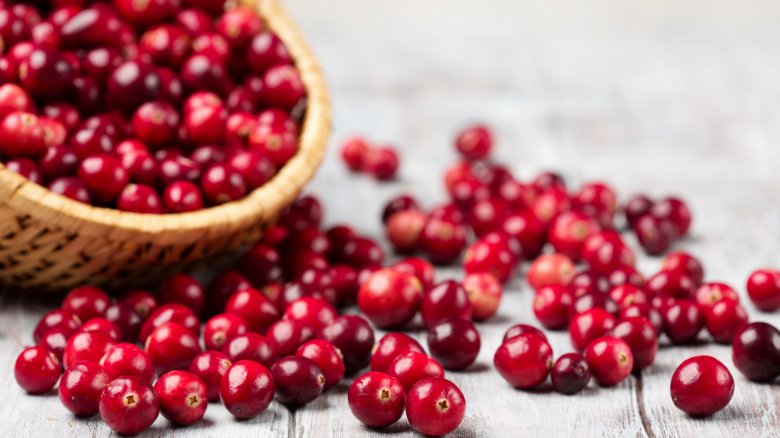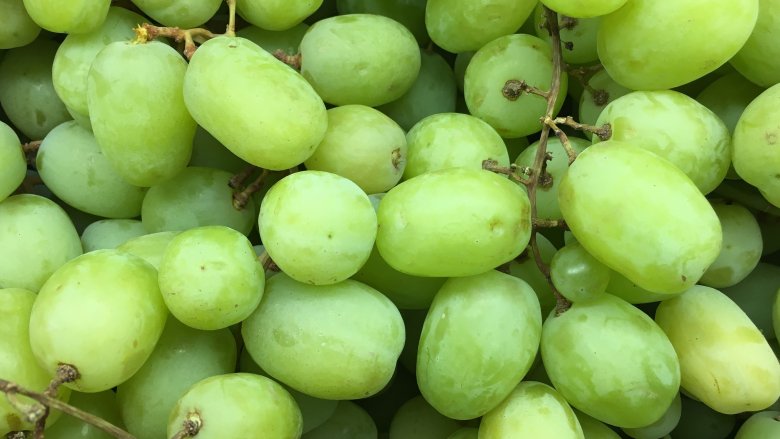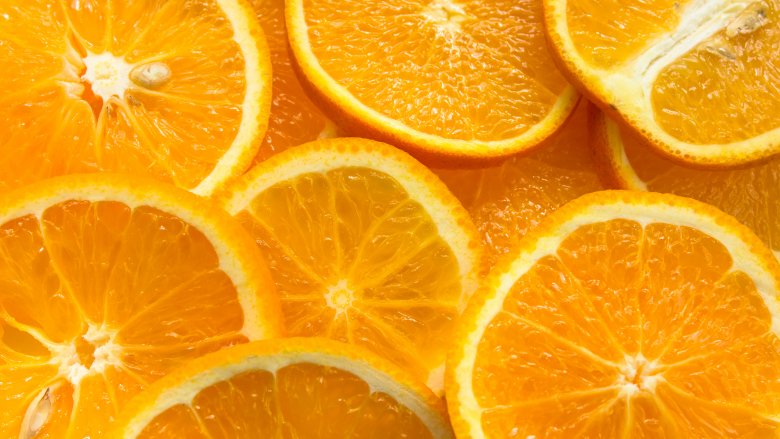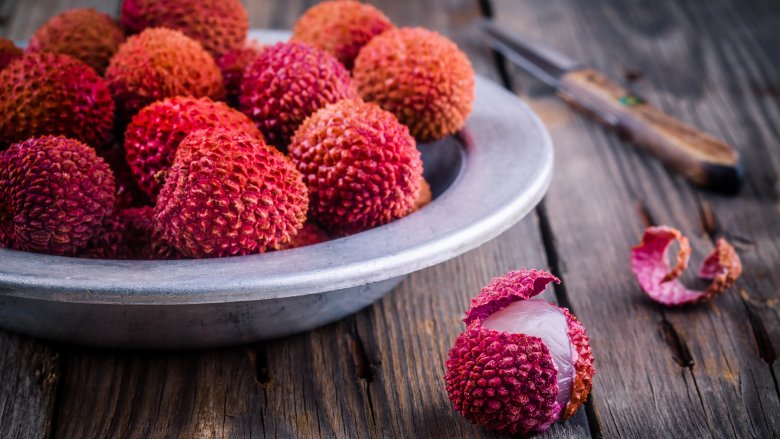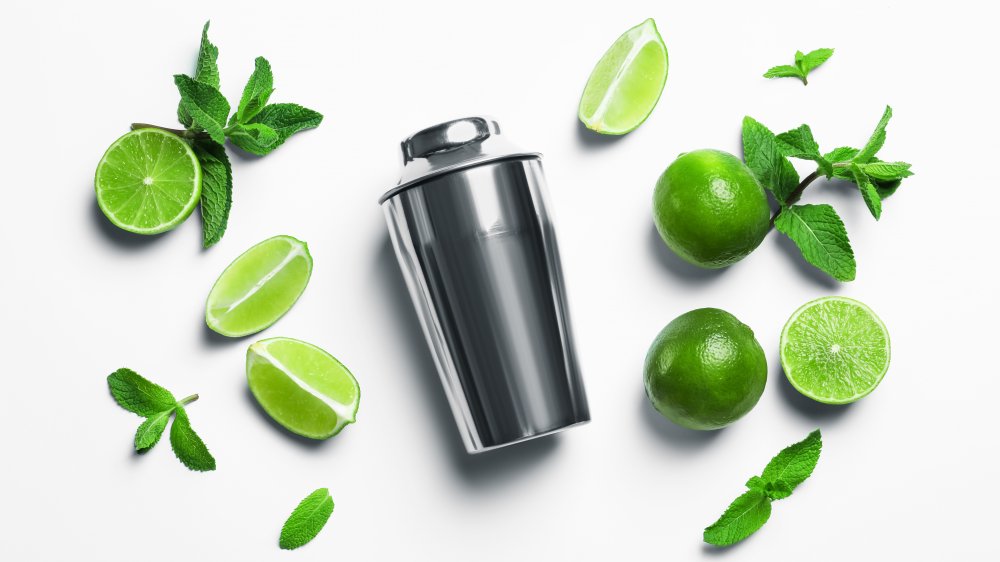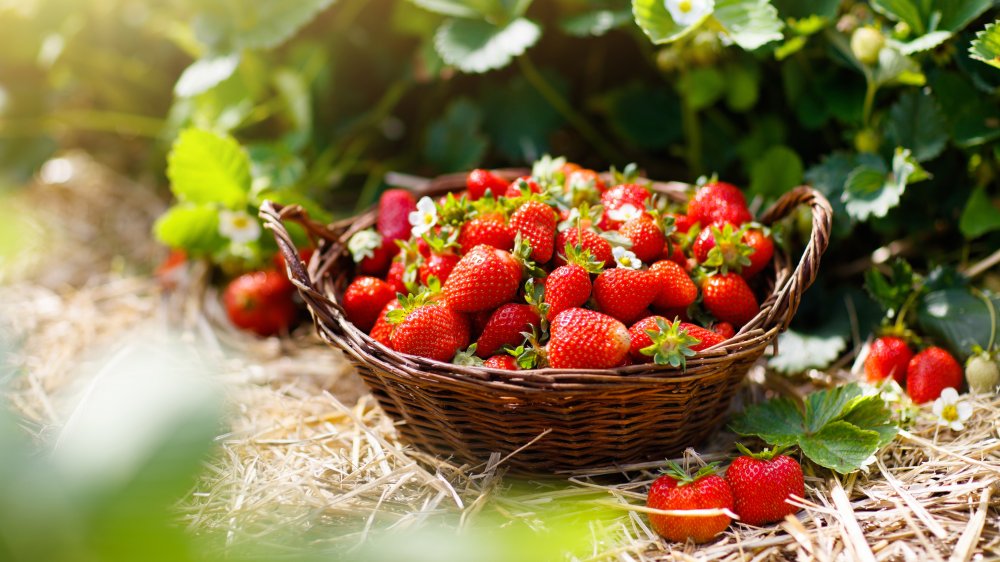10 Fruits You Should Be Eating And 10 You Shouldn't
Who doesn't love fresh fruit? It's delicious, sweet, and good for you. That's what we call a win/win.
If you get a hunger pang, what better choice can you make than a piece of fresh fruit? But unfortunately, not all fruits are created equally. While they all have health benefits, some are healthier than others. And with some fruits, the drawbacks are actually worse than the benefits — talk about a buzzkill! You should be looking for fruit high in fiber and vitamins, and low in calories and sugar. If you don't, you may not be enjoying the healthy snack that you think you are.
If you're thinking about which fruits to use as staples in your diet and which to indulge in only occasionally (and yes, fruits can actually be considered indulgences), it's important to know the facts so you can make the best and healthiest choices for your body.
These are the fruits you should and shouldn't be eating.
Do eat: Pineapple
If you're looking for a tropical fruit packed with excellent health benefits, look no further than the pineapple, rich in vitamin C and manganese. The best reason to eat pineapple, however, is an enzyme called bromelain, which you can only get by eating this tasty fruit.
Bromelain helps you absorb antibiotics, stops diarrhea, and may even fight diabetes, heart disease and cancer, according to a study by Biotechnology Research International. It also shortens the healing time after surgery, and is used for treating inflammation and sports injuries.
If you're looking for ways to incorporate more pineapple into your diet, try putting it on your pizza, cutting up a pineapple and eating it as a snack, or adding it to your smoothies. You can also put in on your oatmeal, add it to beef tacos, or chop it up into some salsa.
Do eat: Blueberries
All berries have incredible health benefits, but blueberries take it to another level. One cup of blueberries contains 4 grams of fiber and only 15 grams of carbohydrates. In that cup, you'll also get 24 percent of your daily recommended vitamin C and 36 percent of the recommended dose of vitamin K. Due to their high fiber content, they'll fill you up without adding much to your caloric intake.
Blueberries have more antioxidants than most other fruit or vegetables, so grab a handful if you want to stay young longer. Antioxidants may reduce the effects of aging by counteracting damage to your DNA.
Studies have also found that blueberries can improve your memory, have anti-diabetic effects, and may reduce muscle damage after a rigorous workout. In addition, blueberries can help prevent urinary tract infections.
Want to eat more blueberries? Put them in your guacamole, mix up some delicious blueberry pancakes, or sprinkle them into your salad.
Do eat: Watermelon
There's a good reason you can find watermelon at most barbecues — not only is it delicious, but it also helps you stay hydrated, as it's 92 percent water. Watermelon boasts numerous other health benefits, including lowering blood pressure and helping with muscle soreness. Watermelon contains a wide variety of nutrients, including vitamin C, potassium, copper, vitamin A, and vitamin B5.
Watermelon's claim to fame, however, is the high level of citrulline you can find in the white part of the watermelon rind. In your body, citrulline turns into the amino acid arginine, which helps many of your internal organs, including your lungs and reproductive system.
If you're looking to eat more watermelon, try tossing it with feta cheese, making gazpacho, or layering it with mozzarella for a sweet caprese salad. Yum!
Do eat: Apples
Apples are cheap, readily available, delicious, and healthy. They may be good for weight loss, as they contain a high percentage of water and are also high in fiber (there are 4 grams in a medium sized apple), so they fill you up without filling you with calories. One study found that subjects who had apple slices before a meal ate an average of 200 less calories during the meal.
Apples peels and flesh also contain polyphenols, a type of antioxidants that have been shown to reduce the risk of strokes and heart disease. There are five times more polyphenols in apple skin than in the rest of the apple, so don't throw that part out!
If you're wondering whether all apples have the same nutritional benefits, they don't. Skip the green apples and go for the red ones, as most of the polyphenols are found in red apple skin.
There's always room for more apples in your diet, and a million ways to cook with them. Add them to your sandwiches, make them into a tasty slaw, or add them to your bakes goods
Do eat: Grapefruit
You'll be surprised to learn how many nutrients are packed into grapefruit. Just half of a grapefruit contains 64 percent of your daily recommended vitamin C, as well as small amounts of protein, vitamin A, manganese, thiamine, folate, and magnesium.
In a 2006 study, researchers found that when participants ate half a grapefruit before each meal, they lost an average of 3.5 lbs in 12 weeks, most likely because of grapefruits' high fiber and water content. Plus, half a grapefruit contains only 52 calories, making it one of the lowest-calorie fruits.
Grapefruit also contains a large variety of antioxidants. One of these is lycopene, which has been shown to reduce the risk of cancer in a number of studies. Grapefruit contains flavonenes as well, which have anti-inflammatory properties.
Grapefruits are acidic and sour, so the idea of eating them raw may not appeal to you. In that case, try sprinkling them with mint leaves, honey, and a bit of salt.
Do eat: Avocado
As if you needed another reason to love avocado, let's take a look at some of the reasons you should be super excited about them. According to one study, an avocado not only contains high amounts of vitamin E, potassium, and iron, but they're also high in fat. Why is that good, you ask? Because it's monounsaturated fat, and it's the kind that helps lower your cholesterol.
There's more, too. The potassium in avocados helps manage blood pressure and fight fatigue, and they're also high in omega-3 fatty acids, which help you reduce the risk of heart disease. There's vitamins B6, C, and D, too, which your immune system needs to keep you healthy. Some of the types of fat in avocados have even been shown to help protect against certain types of cancers.
Avocados are high in calories — one can contain about 400 — but as a part of a healthy diet, they're a must. Try it for breakfast as avocado toast, or filled with an egg and baked.
Do eat: Lemons
In 1747, British researcher James Lind made history with some of the first controlled medical experiments ever conducted. He was trying to find a cure for scurvy, and found lemons worked so well that within a week, the patients he was treating were back on their feet (via the BBC). Today, we know why: A single lemon gives you 139 percent of your daily vitamin C.
LiveScience says that's not the only good thing there is about lemons, either. They're low-calorie, fat-free, and full of folic acid that's been shown to help protect against strokes and improve cardiovascular health. For anyone who's prone to kidney stones, they'll help you there, too. Half a cup of lemon juice a day has been shown to prevent the formation of stones, and studies have suggested, you're also helping your body protect itself against high cholesterol and even cancer.
Some claim lemons help aid in digestion, and while some nutritionists have debunked the idea lemons and lemon water help with weight loss, lemons are a great way to add flavor to water if you're trying to keep hydrated, no sugar needed.
Do eat: Kiwi
Everyone suffers from a little bit of gastrointestinal distress sometimes, and it turns out there's a secret weapon in your fruit bowl that can make you feel better: the kiwi. Studies have found that the fiber present in kiwi has a massive impact on not only aiding digestion, but in improving how well your body absorbs nutrients. There's also evidence that it helps alleviate the pain of constipation, reduce bloating and discomfort, and increase overall gut health.
Studies from Massey University suggest it's an enzyme called actinidin that allows kiwis to be an invaluable addition to any diet. Thanks to the presence of that enzyme, regularly snacking on a kiwi will help make your entire digestive tract more efficient, from start to finish. And another study from the Taipei Medical University went even farther, finding that after adding kiwi to their diet for four weeks, participants who suffered from irritable bowel syndrome (IBS) saw improvement in their symptoms.
Do eat: Jackfruit
You definitely don't have to be a vegetarian or a vegan to enjoy some meat-free meals, and if you're looking to expand your cooking repertoire to more fruit- and veggie-centric dishes, you should look into keeping jackfruit in your kitchen.
Jackfruit is some super weird stuff: according to the AP, it's catching on big-time as a meat substitute. That's because when it's not yet ripe, it can be shredded just like you'd shred pulled pork or chicken. The idea of fruit as the main component in a savory dish might sound weird, but it's got a neutral flavor, absorbs whatever seasonings you want to use, and has a texture that holds up. It's super versatile, too: use it in gyros or tacos, make some faux crab cakes, use it in dips or soups, or even pile it on pizza. Really!
And once it's ripened, it's still good: that's when you want to use it for dessert.
There's still more good news: it's good for you, too. Medical News Today says that jackfruit is full of vitamins and nutrients, and that it's also been found to help lower cholesterol, reduce blood pressure, and balance blood sugar levels. It even supplies the body with what it needs to maintain the health of skin, bones, and blood vessels. It's even full of good fiber that can help keep you regular. That's a lot of good stuff packed into this tropical fruit.
Do eat: Pomegranate
We know, we know... pomegranates are a pain. But you should definitely pick one up at the grocery store for a late-night snack, or even breakfast. Why? They're packed full of goodness.
According to the BBC's GoodFood, pomegranates contain about three times the amount of antioxidants that you'll get in either green tea or red wine. Studies have also suggested that pomegranates can help fight inflammation, and lower your blood pressure and risk of heart disease. When another study looked at whether or not a daily glass of pomegranate juice might help improve memory, results were promising.
Healthline calls pomegranates one of the healthiest fruits in the world, and that's a pretty big claim. The reason, they say, is that pomegranates contain two unique compounds: punicalagins and punicic acid. That's what gives them most of their health benefits, and it's possible there's still more to be discovered: pomegranates have even been linked to an increased success rate in fighting certain types of cancers.
Still wondering if it's worth it? Here's a tip to make getting all those seeds out easier: score the skin, and break the fruit into quarters. Submerge in a bowl, and start gently breaking it apart. The seeds will sink and the inedible pith will float. Easy peasy!
Don't eat: Bananas
You may want to think twice before eating a ripe banana for breakfast. Unlike some fruit, bananas contain mostly carbs. In fact, 93 percent of their calories come from carbohydrates. Also, they contain up to 16 percent sugar.
Unfortunately for ripe banana lovers, the healthy starches found in unripe bananas, which actually act more like fiber than carbohydrates, turn into sugar as a banana ripens. In the process, the banana becomes more and more sugary.
Instead of picking up a banana on your way to work, consider grabbing an apple or a grapefruit. They will fill you up without loading your bloodstream with sugar. Or, if you can't resist that banana, eat a smaller, greener one.
Don't eat: Mangoes
Like bananas, mangoes have a larger percentage of sugar than other fruit, which is why they taste so sweet. One cup of mango contains 100 calories and 23 grams of sugar! With all of the fruits available that have a lower sugar content, you may want to stay away from mango, especially if you're trying to lose weight.
If you can't bear to cut them from your diet completely, eat them sparingly. For example, instead of making a mango smoothie, use a base of pineapple and put in a few small slices of mango for taste.
Don't eat: Cherries
Due to their small size, cherries are also easy to scarf down by the dozen. But, like mangoes and grapes, cherries contain a higher sugar content than many other fruits. One cup of cherries contains 17.7 grams of sugar. This makes them a poor fruit choice for diabetics and dieters.
Also, because cherries are a high FODMAP fruit, they may make you bloated. FODMAPs are found in many fruits and vegetables and create gas and bloating because they're difficult to digest.
Instead of packing a bag of cherries to take with you to work, make a berry mix instead. That way you'll be satiated without the sugar overload and bloating.
Don't eat: Coconut
Coconuts are in vogue right now, but they aren't as healthy as people want to think. In fact, one cup of shredded coconut contains a whopping 283 calories, 224 of which are from fat. This makes it one of fattiest fruits around.
Instead of putting shredded coconut on your oatmeal, consider sprinkling in some blueberries instead. Your waistline will thank you.
Don't eat: Cranberries
You've probably heard that cranberries and cranberry juice are the perfect, all-natural cure for a UTI, but according to the Journal of the American Medical Association, there's no evidence that cranberries actually make a difference when it comes to urinary tract health. The belief was that cranberries lowered the pH of urine, but recent studies have shown that the substance usually credited with doing this — hippuric acid — isn't present in high enough quantities to have any real impact.
In fact, consuming too many cranberries might actually increase your risk for certain types of kidney stones. Cranberries have a high amount of oxalates that can translate to an increased risk of calcium oxalate stones. There's another problem with cranberries, too. Not only are they extremely high in calories — a third of a cup contains about 123 calories and half a gram of fat — but many kinds of dried cranberries contain a huge amount of added sugar. That same third of a cup can have 26 grams of sugar, more than the 24 grams of daily sugar recommended for women.
Don't eat: Grapes
Have you ever found yourself eating an entire bag of grapes in one sitting? They're so easy to pop into your mouth without giving them a second thought. And they're fruit, so they can't hurt anything, right? Unfortunately, grapes do have some negative side effects.
The negative effects of eating grapes include weight gain, carb overload (one cup of grapes contains 27 grams of carbs), gut issues, and allergy attacks. Turns out, this easy snack is not as harmless as you thought.
Don't eat: Oranges
But... but... but! You're probably already wondering why you should banish oranges from your life, and according to the University of Rochester Medical Center, it's because oranges are so acidic that they can do some serious damage to your teeth. Oranges — and orange juice — have been linked to not just decreasing the hardness of tooth enamel, but of eroding teeth so much that the enamel becomes roughened and more likely to erode even further. The damage they saw from oranges was similar to the damage done by sugary sodas, and you've probably heard plenty about just how bad those can be.
Affiliated Dentists lists oranges as being among the worst foods for your teeth, and they recommend that if you have to drink orange juice, you should use a straw to keep your teeth safe.
Don't eat: Lychee
The International Business Times reported on a partnership between Indian and US officials that solved the mystery of the illness plaguing the city of Muzaffarpur for more than 20 years. Every year, starting in May, some of the area's children would go from healthy to hospital overnight. There would be seizures and a loss of consciousness (via the BBC), around 40 percent of victims would die, and whatever was happening would stop in July. There were tons of theories, and it took a years and a major collaboration to determine it was lychees.
The first clue was that children with low blood glucose levels were more likely to die from the mysterious illness. Researchers confirmed lychees — particularly unripe ones — contain a toxin that keeps us from synthesizing glucose. That, in turn, leads to low blood sugar levels, and we all know that can cause some major problems. The children of Muzaffarpur (which produces about 70 percent of India's lychees), were filling themselves with lychees after skipping an evening meal, and it proved to be a deadly combination. If you're struggling with managing your blood sugar, give these a miss.
Don't eat: Limes
This is a tough one because on the surface, limes are good for you. They're full of vitamins, nutrients, and antioxidants, says Healthline, but they fall into our "don't eat" category because they come with a few very important footnotes.
Let's say you prefer to have your limes in an ice cold beverage, preferably while you're sitting outside enjoying a brilliantly sunny day. Healthline also warns that this can come with a nasty side effect: itchy rashes and second-degree burns.
How's that? Limes contain a chemical called furocoumarin, which reacts with sunlight. When it does, it gets absorbed into your skin, and the result is some pretty uncomfortable burns, blisters, and dark patches that could take months to heal and disappear. Skin damage, no matter where it comes from, is never, ever cool.
There's one other thing you should be aware of, too: limes can interfere with some medications. According to Pharmacist.com, limes inhibit the function of an intestinal enzyme called CYP-3A4, which plays an important role in the way medications are absorbed into the body. Bottom line? Check with your doctor before you enjoy your next lime.
Don't eat: Strawberries
No, say it ain't so! Strawberries are delicious and they're good for you, but there's a major catch: strawberries that come from major, large-scale producers are often terrible for the environment... and for the people who are working to grow them.
According to The Conversation, strawberries are a top crop in California. Unfortunately, in order to keep up with demand, farmers have started to rely on toxic chemicals and soil fumigants to keep their plants producing year-around.
Wait, what are soil fumigants? Before strawberries are planted, the ground is fumigated to get rid of pests in the soil. Think of it as similar to fumigating a building for, say, bed bugs. One industry favorite — methyl bromide — was banned when it was discovered just how much damage it was doing to the ozone layer, and another — methyl iodide — was pulled when it was discovered to be both a neurotoxin and a carcinogen. There are some chemical-free strawberry farmers out there, but only a small percentage are using methods that aren't destroying the natural balance of soil... or presenting a danger to those who are doing the spraying.
